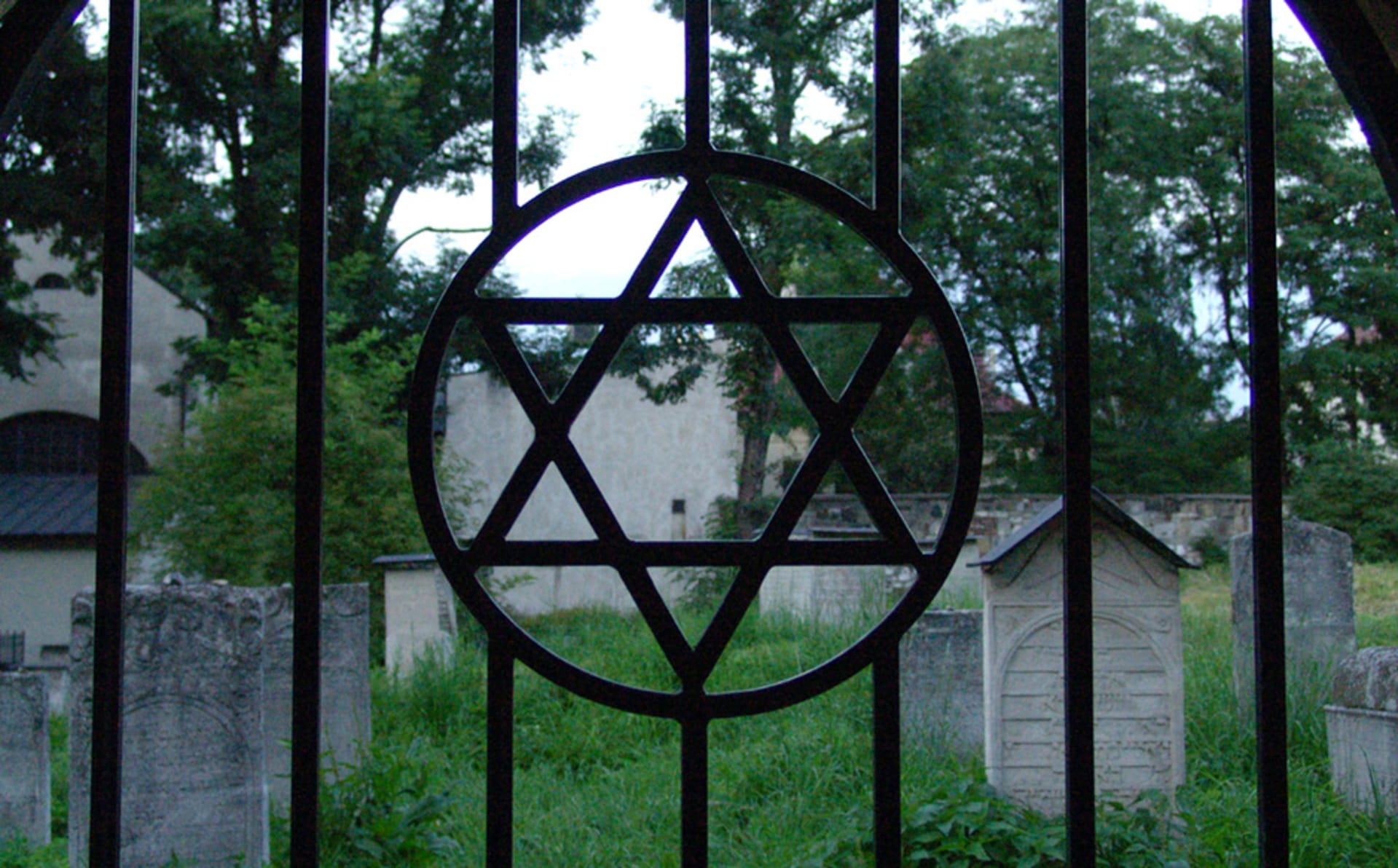
A day in the life: 24 Hours in Krakow
In each issue of our print magazine, we visit various cities around the world, speaking with residents and getting their stories. Coinciding with the city’s annual Unsound festival, we present a portrait of Krakow from its own residents, originally printed in our Fall, 2011 issue.
Since the fall of the Iron Curtain, Krakow has earned an international reputation as the epicenter of cultural life in Poland—thanks in no small part to generous public funding and, bizarrely, the success of Steven Spielberg’s Schindler’s List. Over the past fifteen years, the city has rediscovered its Jewish and bohemian identities; while the former Jewish quarter of Kazimierz is now teeming with jazz clubs, cafes and reconstructed relics of Jewish culture, the city as a whole has become an amalgam of a dark past and bright future.
07:15: Coffee at KOLORY cafe, ul. estery 10, Kazimierz
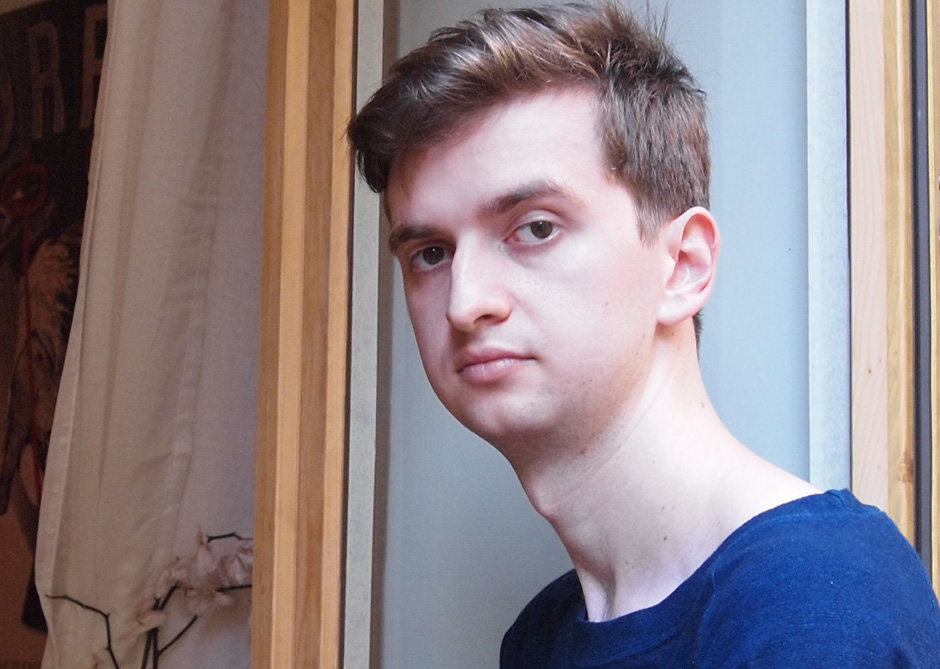
Radek Szczesniak, PR and Programming for Unsound Festival
Krakow is small, so most of the cafes in the Old Town are filled with tourists who pop in for a quick coffee and then move on. Kolory is a different story. When I want to meet up with somebody in the morning, I almost always do it there. Even though I don’t drink coffee, the rich and pleasant smell of espresso fills the entire place. I usually stick to the French style breakfast, which is good for something small and sweet on the cheap. If you take a look at the walls, every photo and every picture is some reference to Paris, which somehow fits the neighborhood’s Bohemian aesthetic.
Poles actually don’t eat breakfast out, so the only reason they offer it in Kolory is because it’s also a B&B. Like so many bars and cafes in Kazimierz, it only opened up a few years ago. But it doesn’t feel new in a bad way… There used to be almost no young people in the area—only boarded-up buildings and sketchy-looking guys milling about. But after the fall of the Iron Curtain, more and more people started coming to the Jewish quarter, and everything changed really, really fast. Kolory is a perfect place to take it all in slowly—that is, until night falls. When the bar’s full, shouting is the only way to have a conversation.
08:30: Auschwitz Tour, Michalowskiego 11, Old Town
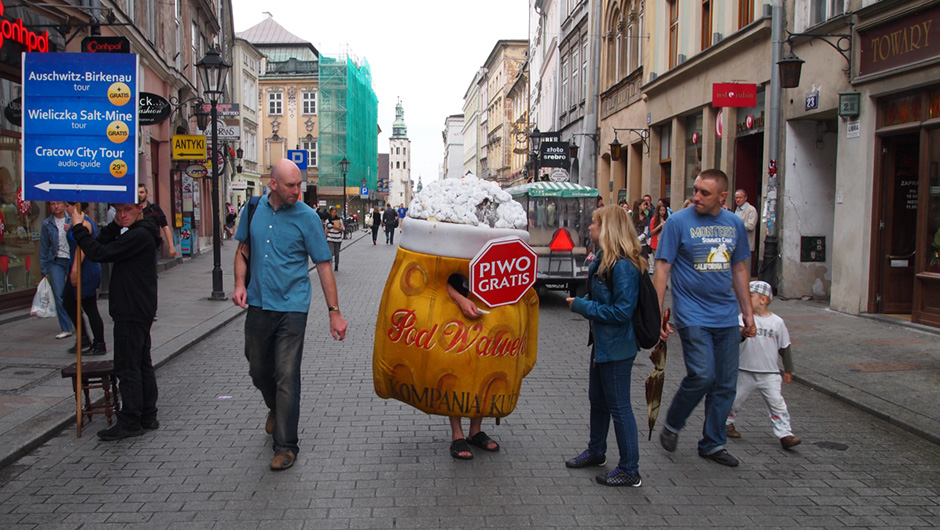
Luczan Klimaszewski, tour guide. Above: It might be irritating at first to constantly see Disneyland-like billboards offering tours of concentration camps, but after a few days you get used to it.
I’ve been driving these small electric cars around town for a couple of years now, doing tours of Krakow and selling tickets for attractions outside of the city—mostly day trips to Auschwitz and the salt mines. In Poland, the Holocaust and Auschwitz in particular are still incredibly fresh in our collective memory. Everybody I know, and probably every Polish person eighteen or older, has been to Auschwitz on a field trip. I grew up here and have a special interest in the history of World War II and the Holocaust so it’s kind of embarrassing to admit, but I’ve actually never been to Auschwitz. I can’t remember why I didn’t get to go on my school trip, I was probably sick or something. But the more interesting question is why I haven’t gone to see Auschwitz on my own. I constantly tell myself that it’ll always be there, so I can go and see it whenever I want—it doesn’t have to be now. Clearly I’m putting it off, but not consciously. I know what I’m going to see there, I know how it’s going to affect me. I know myself, and I know I’m going to have a very hard time when I go. I’ll be destroyed emotionally for a few days, so I’m really not in any rush. I will go, because I think it’s an important thing to do. But, you see, it’s not that easy.
Some people think it’s strange the way tours for Auschwitz are advertised and that there’s a tourist industry that’s sprouted up around the camps. I don’t think it’s strange at all. For me, it’s normal. You know, when we advertise Auschwitz, we don’t have to tell people what they’re going to see, we just help them get there. Auschwitz should be remembered, but it shouldn’t be a taboo. It shouldn’t be un-utterable, and it definitely shouldn’t be hidden. I think most Krakow natives are probably immune to seeing the word “Auschwitz” on tour advertisements. I’m usually only reminded of what Auschwitz is when I see the traces of Jewish life in the city, usually the synagogues.
11:17: Meet Bartosz Szydlowski , Laznia Nowu Theater, os. Szkolne 25, Nowa Huta
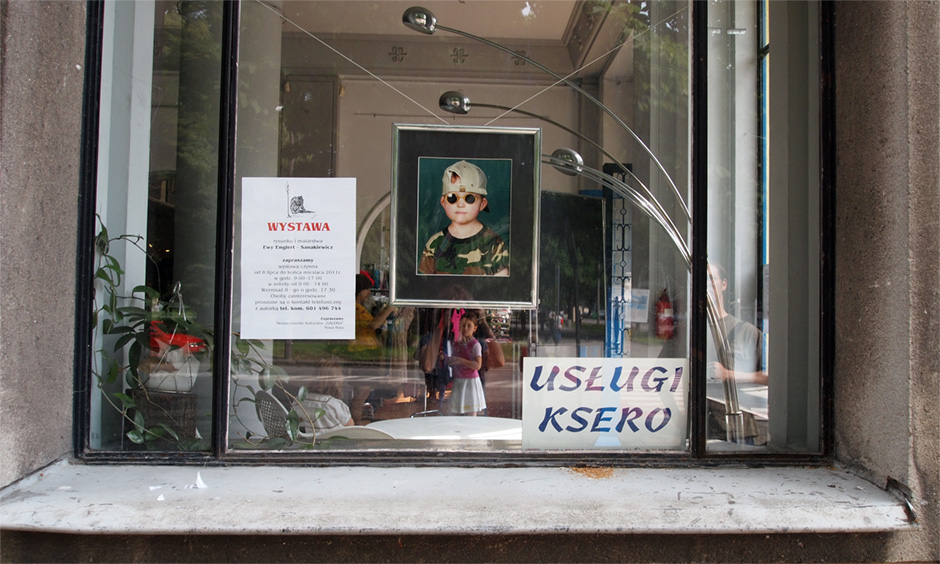
Bartosz Szydlowski, Theater Director, Laznia Nowa. Above: Lights, camera, camouflage. Nowa Huta’s next generation, conspicuously disguised.
In many ways, Krakow is a very conservative city—very bourgeois. Not so much politically, but more culturally. There’s nothing wrong with that per se, but it can be a serious obstacle for developing a creative community outside of the establishment. Nowa Huta is the biggest district in Krakow, with around 250,000 residents. It’s a district that’s been economically marginalized and written off by many as a cultural desert. Over the past ten years, the feeling of abandonment has only increased; the steel manufacturing plant has been closed down, there’s massive unemployment and people around here are frustrated. We all had big expectations after the end of communism, but the promised land of a “New Poland” has turned into a nightmare for so many. Culturally speaking, the elitism of the educated class only compounds the problems of the poor. Culture shouldn’t be held hostage in an ivory tower and that’s why I’ve moved the theater to this area; that’s what this theater is about.
The theater itself is enormous, the biggest in Krakow. It feels like a miracle to have actually convinced the local politicians and municipal boards to support our cause. Slowly people are starting to understand that high art and community activity don’t have to be mutually exclusive. They can’t be! For me, theater is not only about the performance. It’s not just a meeting between actor and audience. I see it as a stream of activities that should reinforce the connections between art and society. We want to be able to tell the stories of the people in the community, whether through the medium of a more well-known piece or by having the people tell their stories themselves. That idea may not sound so radical today, but here, five or six years ago, this was unimaginable. I think we’ve helped give a voice to the people of Nowa Huta, and I’m infinitely proud of that. I actually grew up here, which may explain my attitude a bit. I was always something of an outsider, because my parents didn’t work in the steel mill—they were philosophy professors. Nova Huta has become a Bermuda Triangle of churches, supermarkets and television. I want to offer people a way out.
12:31: Lunch at U Stasi, Mikolajska 16, Old Town
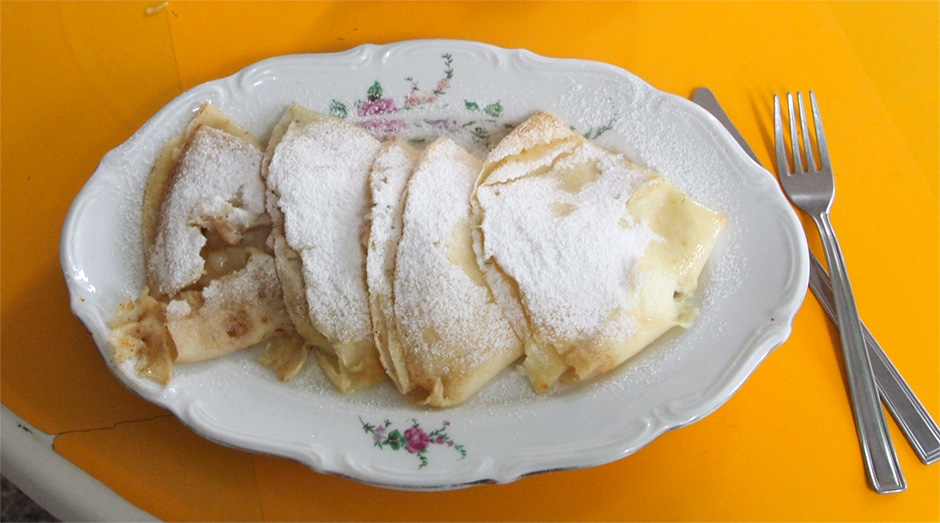
Karol Hordziej, Director Krakow Photomonth. Above: You don’t have to wait long for your pierogis at U Stasi restaurant and milk bar.
U Stasi is a typical Polish “milk bar”—a kind of subsidized cafeteria where everybody can get good food cheap. Milk bars are one of the few extremely positive remnants of the communist era. I don’t know how long U Stasi has been around, but I know that my parents were going there when they were students. A bowl of soup will cost you 2 Złoty and 79 Groschen, which is a reduced price because the government is paying for part of your borscht. For Polish food there’s really only super cheap or super expensive. There’s nothing in the middle; the middle is Italian food or Chinese or something. Don’t ask me why.
One of the special things about U Stasi is that the staff is incredibly fast. The guy running the checkout has been around as long as I can remember. As soon as you tell him what you’ve eaten, he’s immediately able to tell you the sum without using a calculator or computer. The guy calculates faster than the machine can spit the change back at you. I think he also knows what everybody has eaten—not that anybody would want to cheat them out of the pittance they make on the food anyways. Food-wise, I mainly stick to the soups and pierogis. The pierogi ruskie with a white cheese, potato and onion mixture is probably one of my favorites, with the sweet plum-filled pierogi coming in a close second.
02:50: Meet the skaters, Powisle, Wawel Castle
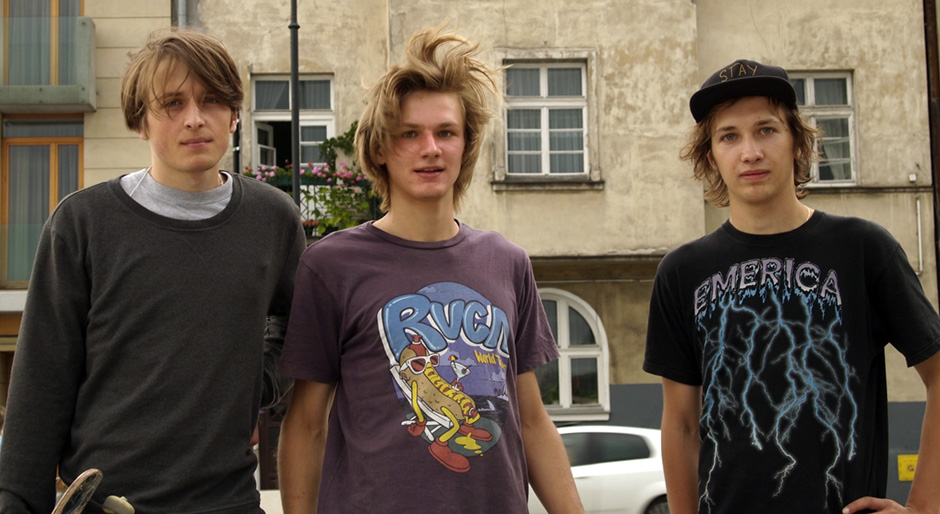
Sprzymierzeni Crew. Piotrek, Kacpar, and Kuba travel all over Europe in search of newer, better, and more public skate spots. The group aren’t afraid of confrontations with police or pedestrians. At all.
We’re skaters—it’s who we are; it’s our identity. The name of our crew, Sprzymierzeni, can literally be translated as “allies”. Most skaters are lazy. When they go to a new town or city, they head directly to the next park and skate the ramps and street courses installed for them. But these places suck because they’re too clean. That’s why we travel around Poland and Europe for the best public areas to skate, because we believe that skating is about using the terrain that’s not designed for skating. Skate videos are rad, and that’s why we make them. But we also think it’s important to document alternative, creative approaches to public space. The police are always hassling us, because people are always complaining about the noise or about a curb being waxed. It’s true, we’re noisy, but we don’t break anything, and street traffic is twice as loud as we are. We sometimes find it hard to identify with people that don’t skate. What we do is a way of life; it’s all consuming. To be honest, it’s hard to remember what life was like before we started skating. We never played any other sports very seriously… But what we do is not a sport, because it’s not about competition.
When we get thrown out of a spot, we immediately look for another. But if the first one is that good, then we’ll wait an hour or two and just go back—usually when we’re looking to film one of us landing a specific trick. Getting kicked out of a great spot is annoying, but skating should be confrontational… in a good way. People need it drilled into their heads: skateboarding is not a crime.
03:43: Jewish Community Center, Miodowa 24, Kazimierz
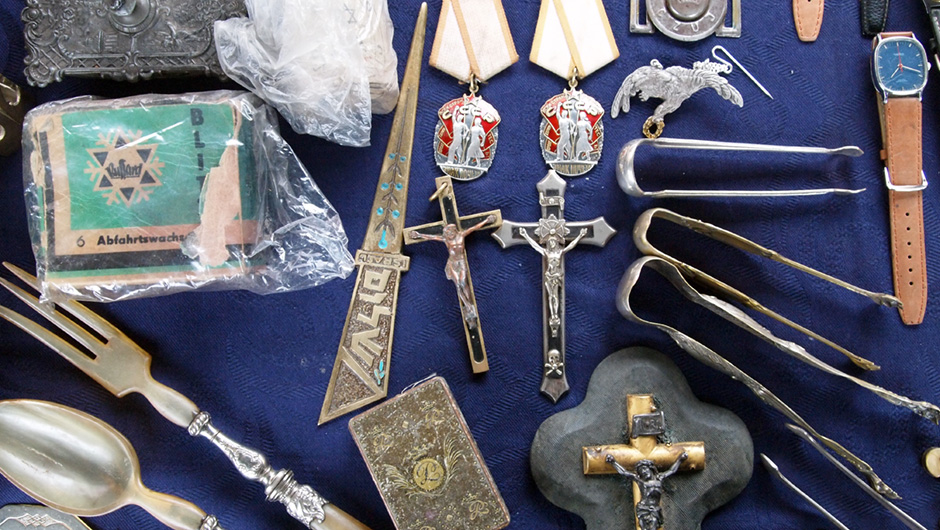
Anna Gulinska, Programs Manager, Jewish Community Center. Above: Jewish, Catholic, Communist and Nazi memorabilia are sold side by side at the flea market on Nowy Square, Kazimierz.
Lots of people have this idea that the Jewish community in Poland, if it exists at all, is only made up of older Holocaust survivors. That’s not the case. But comparatively speaking, Krakow’s Jewish population is pretty tiny. There are only around 120 registered members of the official Jewish community here, but you have to see this number in context: To become a member of the community you have to be able to present documents proving that you’re Jewish, which is pretty hard to do. So much of the documentation was lost or destroyed when people were sent off to the camps. And plenty of other people just aren’t keen on being officially registered as a Jew, for obvious reasons. Our center has around 370 members, and lots of young people. Slowly but surely, the community is growing. It’s not the 70,000 Jews that lived here before the war, but we’re making progress.
I feel somewhat ambivalent about how the former Jewish neighborhood of Kazimierz has been reinvented as a kind of Disneyland for Jewish culture, with the Klezmer music and fake Hebrew fonts and what not… to me it’s a bit cheesy. My boss likes to call it “Jew-rassic Park”. But it’s definitely helped to spread the word about Jewish life, even if it’s an antiquated image. We send members of the center all over the city to give talks and presentations about Jewish culture. We also do lots of work in prisons, believe it or not. In Poland, many prisoners are involved in a program cleaning Jewish cemeteries and tending to Jewish gravestones. With all of the information about the demise of Polish Jewry, we think it’s important teach about about Jewish life as well. It’s incredible how receptive the inmates are to learning about the history of Polish Jewry. In general, we’ve been pleasantly surprised by how easy it’s been for the center to become integrated into the neighborhood. Most everybody has been welcoming, and the majority of the shop and restaurant owners from the area have popped their heads in to say hello. And it says a lot that when we have an open house or put on a festival, we’ve never needed any police protection or extra security. That might be normal for places like the U.S.A., but certainly not for Europe.
05:22: Korporacja Ha!art Books, pl. Szczepański 3a, Old Town
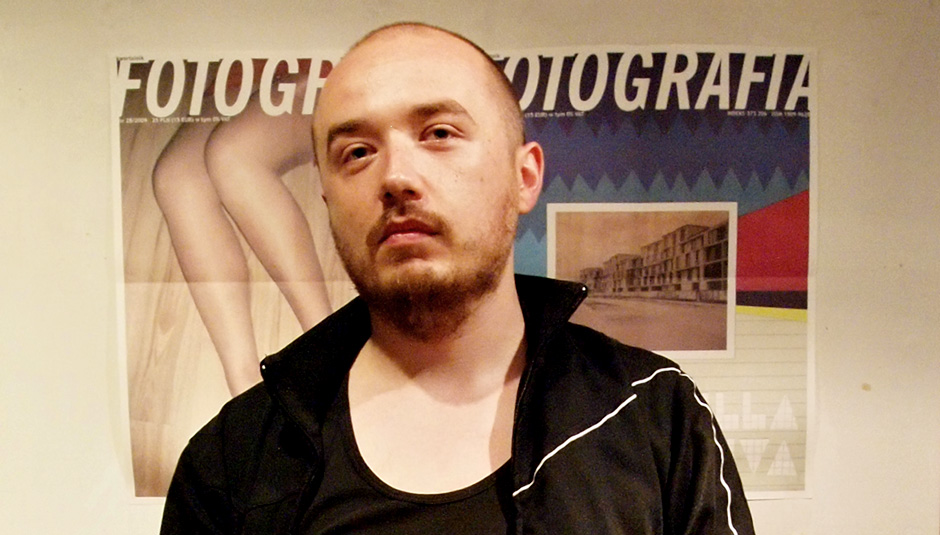
Michal Borecki, Korporacja Ha!art Books. Borecki helps run Korporacja Ha!art and publishing house. The future of print in Poland is in his hands—every day.
I think books in general are niche these days—at least in Poland. I’d love to be able to say that there’s something really exciting happening right now in Polish literature, but actually there isn’t. A few years ago, the twenty-somethings were starting to publish and get their ideas out, but those days are over. It’s really hard to find good young authors, although we receive tons of manuscripts from kids and young adults born in the late eighties and early nineties.
I know that it’s a worldwide phenomenon, but here it really feels like people have stopped reading literature. You know, for thirty-six straight weeks in Poland, the number one best seller was a book on how to lose weight. And what little new literature there is has somehow become totally depoliticized. Our last big seller was written by an eighteen-year-old high school girl from here in Krakow. When she pitched her manuscript she told us, “This is a book about nothing.” And it’s true—it’s a book about being bored all the time. Four hundred pages worth.
07:50: Dinner at The Olive Tree, ul. Kupa 6 , Kazimierz

Yitzhak Horvitz, Restaurateur, The Olive Tree. Above: A typical store window in Krakow’s Old Town: what you see is what you get.
After I served in the army in Israel, I worked on a security detail in Vienna, where I met my wife. We went back to Israel not too long after that and I decided to become a rabbi. The thing is, I like travelling, so we decided to move to Kiev, where I took a position as a rabbi for a short-term project. When that was done I had an offer from a small congregation in Dortmund, but Krakow seemed the more attractive alternative.
This is the only kosher restaurant in the city. I mean, this is Kazimierz, so you have plenty “Jewish style” restaurants and tourists flock here to see the traces of Jewish life that flourished before the Nazis. But there wasn’t a single restaurant where observant Jews could eat proper kosher food until I opened up. I mean, the “Jewish style” places look nice and they draw lots of people with the Klezmer music and all that, but they just don’t smell anything like home, if you know what I mean. Because kosher isn’t just about what kind of food you serve—it’s about how you serve it. What we serve is nothing short of highest quality gourmet food, which also happens to be kosher. But it’s not just normal kosher, it’s the highest possible kosher standard. Rabbi Westheim of Manchester issued our certificate, and if you know anything about kosher gastronomy in Europe, you know that it doesn’t get any better than that. It’s an honor. Between here and London, there’s not another restaurant certified by the rabbi. I literally get calls from all over Europe with people asking “Is it true? Did Rabbi Westheim really issue your certificate?” You have to understand: the first question an orthodox Jew asks about a restaurant is not “How’s the food?”—it’s: “Who certified it?” I want the world, and especially non-Jews, to realize how good kosher can taste. We can promise that every piece of food, every vegetable, every leaf of lettuce has been inspected by my supervisor and myself for insects and other impurities in the most thorough possible fashion. People don’t understand that if you don’t take your time washing the food, you’ll have a zoo in your salad. You can taste the difference.
09:45: Meet Gosia at Miejsce, ul. estery 1, Kazimierz
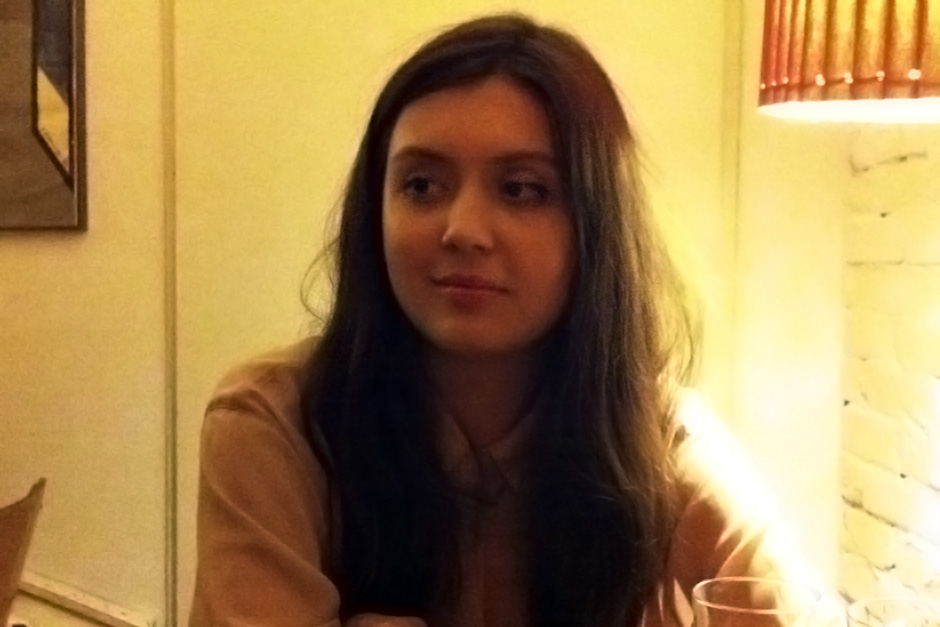
Gosia Plysa, Director, Unsound Festival
Before we had an office to organize the Unsound Festival, we would always meet up in the afternoon in Miejsce Bar in the center of Kazimierz to work on scheduling, booking, and PR stuff. We’d usually start out in the morning in Kolory Cafe, and then move on to Miejsce around lunchtime. At some point we did the math and realized that renting an office and buying our own coffee machine would be far cheaper, so that’s what we did. But going from working in a cafe to working in an office is not as easy as it sounds: peripheral distractions can sometimes make the work a lot easier. To be honest, we kind of miss it. Even though we’ve found our rhythm in the office, we still go to Miejsce almost every night.
The first few editions of Unsound were really organized in bars. And when the festival is on, Miejsce turns into an unofficial meeting point for the artists, journalists and festival-goers. Last year, Ben Frost and Adam Wiltzie DJ’ed spontaneously from their laptops, which really got the crowd going. The place was packed. You couldn’t move, but you also didn’t want to.
11:12: Meet Radek at Unsound office
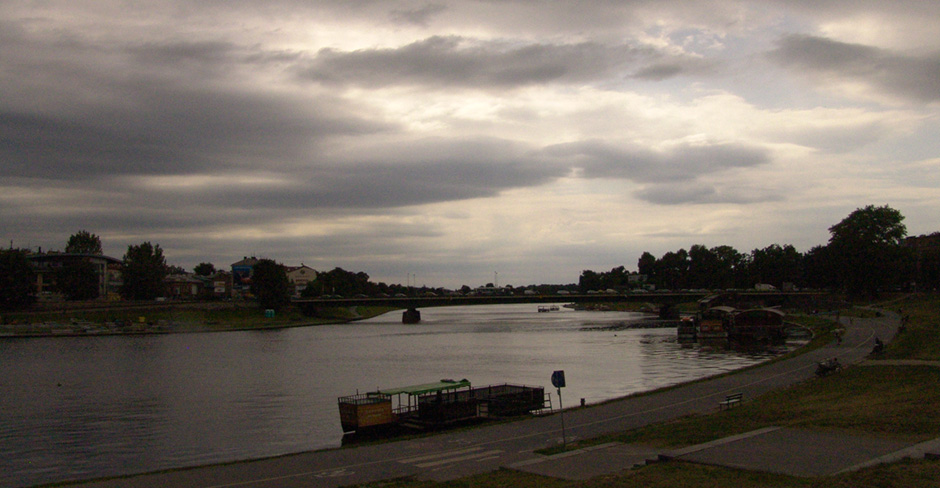
Radek Szczesniak, PR and Programming, Unsound Festival. Above: Wawel River at dusk.
Unsound is all about combining an avante-garde program with more classical techno and house and new sub-genres of electronic music. We like to pair artists who are established with those who are up and coming. People need to know how much incredibly good electronic music there is in Eastern Europe and how receptive our audiences are. Collaboration is extremely important to us—it all circles around the idea of building new bridges between East and West and strengthening pre-existing ones. This goes both for the festival and for the mixtapes and albums we bring out. We had Stefan Betke curate our Connections LP, which was all East-West collaborations. This year we’ll have Ben Frost and Daniel Bjarnason doing a piece together with the Krakow Symphony Orchestra, based on Andrei Tarkovsky’s Solaris—with Brian Eno on visuals… Tarkovsky’s version is based on a novel by Stanisław Lem, who was from Krakow. So I guess it all comes full circle.
01:37: Klub Alchemia, ul. estery 5, Kazimierz
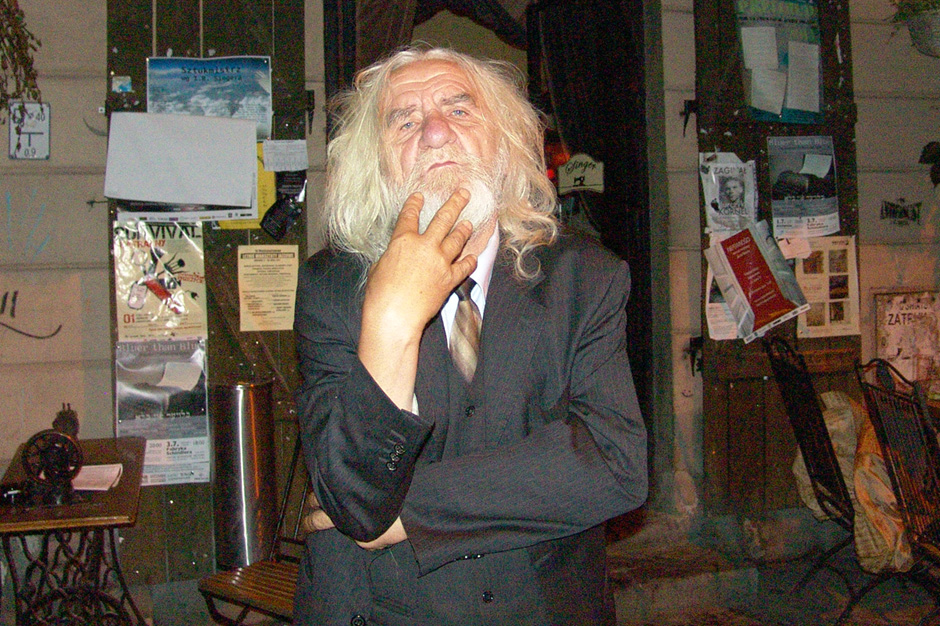
Lukasz Rogulski, Booker, Klub Alchemia. Above: Ultra-progressive free jazz has strangely become the norm in Krakow. This avid concert-goer takes a break from the music to strike the thinking man’s pose.
Alchemia has been around for over twelve years. It was the first jazz venue to move into the district of Kazimierz, and if you knew how derelict this neighborhood was back in the day, you’d know that that’s no small feat. Booking for a good jazz venue is a bit like alchemy, because jazz fans are a notoriously picky bunch: some only come for fusion and free jazz; others are old-school purists. We book lots of bigger acts from all over the world. Ken Vandermark was here not too long ago, as well as Peter Brötzmann . . . On the whole the acts we book tend towards a free jazz and avant-garde direction, which bleeds over into the atmosphere of the café as well. I can’t quite explain it, but the atmosphere is, well, free.
I wish I had more time to actually see the music that’s being played live at Alchemia. Sometimes it seems like the multitasking that I have to do fits perfectly to a jazz venue, especially when the band gets louder and louder and you can hear it push and pulse from the basement stage. It’s ridiculous what the musicians and concert-goers leave behind after shows—all sorts of random shit. One guy left a massive case for a double bass. How is it possible to forget something that big? ~
This text first appeared first in Electronic Beats Magazine N° 27 (3, 2011). Read the full issue on issuu.com or in the embed below.
Published October 14, 2013. Words by A.J. Samuels & Michael Lutz.
